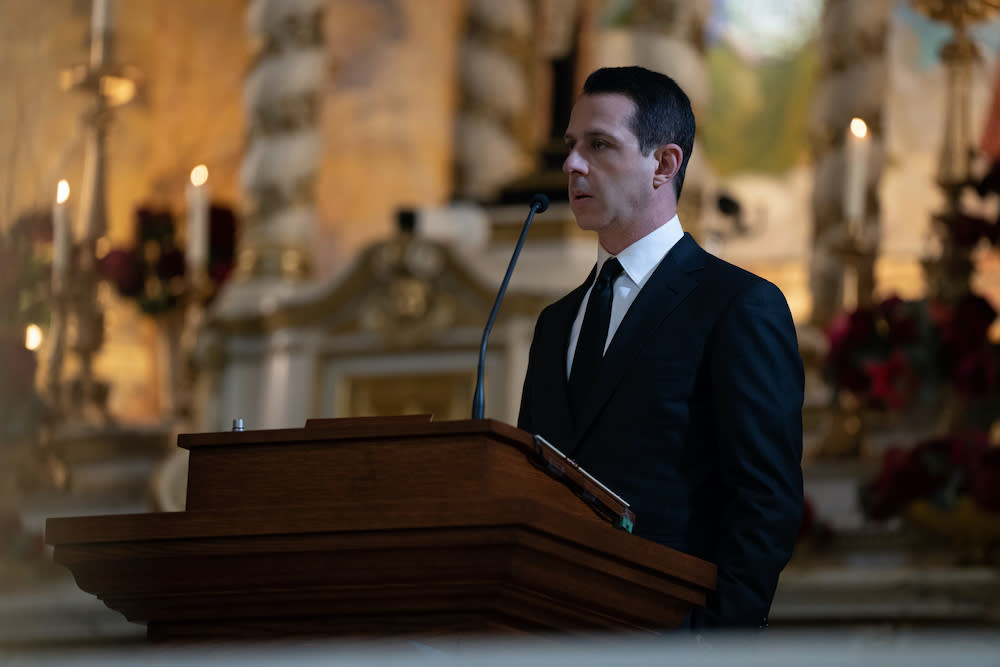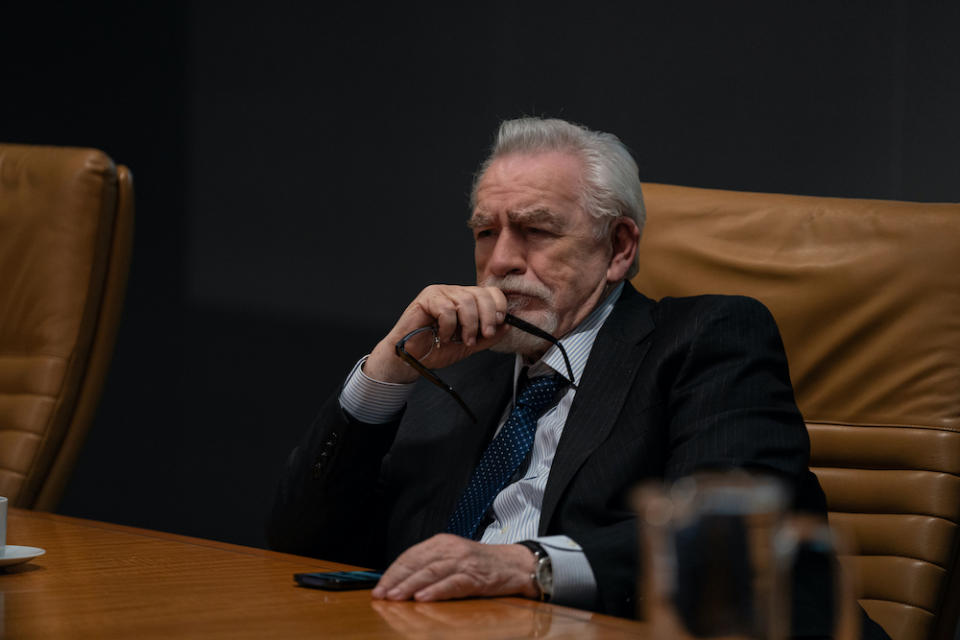‘Succession’ Secured Its Place Among TV’s Greats with One Massive Bet

- Oops!Something went wrong.Please try again later.
- Oops!Something went wrong.Please try again later.
- Oops!Something went wrong.Please try again later.
[Editor’s Note: The following article contains spoilers for “Succession” Season 4, through the ninth episode. It does not spoil the finale.]
Midway through a recent conversation about her new movie, “You Hurt My Feelings,” Julia Louis-Dreyfus just couldn’t wait any longer. She stopped her moderator, Frank Rich, and said, “God, what a season you’ve had on ‘Succession.'”
More from IndieWire
Brian Cox Calls 'Succession' the 'Greatest Work Experience' of His Career
Jeremy Strong Actually Drank Kendall's 'Meal Fit for a King': 'I Went Outside and Retched'
Rich, an executive producer on the HBO drama — who served the same role on “Veep” — nodded his thanks and started to ask the next question, but Louis-Dreyfus wasn’t done.
“I really do think that killing off Logan [when you did] was inspired,” she said. “Utterly inspired.”
Rich quickly gave credit to Jesse Armstrong, the “Succession” creator who also co-wrote the first season finale of “Veep” — “which I won an Emmy for,” Louis-Dreyfus playfully pointed out — and in doing so, he outlined why the timing of Logan’s death proved so pivotal.
“The typical way to do it with a character [that important] is on his death bed in the final episode of the show,” Rich explained. “[But Jesse] always said, ‘I want him to die three or four episodes into whatever season it happens, so we have the runway to see what happens to these kids — who are traumatized by their father — once he’s gone.'”
“Brilliant,” Louis-Dreyfus said.
“Everyone thought it was brilliant — except for Brian Cox,” Rich said, getting a big laugh from the audience.
The outspoken Cox has voiced his hang-ups over Logan’s “early” exit, but come September, we’ll see if those lingering feelings of rejection dissipate when he’s holding an Emmy. “Succession” Season 4 continues to earn rave reviews, week after week, widening a cultural footprint that’s bound to grow in the days, months, and years to come. Why? The Emmys help, as do modern viewership habits. Audiences catch up at their own pace, often after a series is available in its entirety, and the final episode is set to air in just a few days.
The hotly anticipated finale will surely have an impact on how “Succession” is remembered, but what ensures the series’ lasting legacy already happened. It was Logan’s death, way back in Episode 3. By examining how the Roy family processes the loss of its leader — and what comes next after he’s gone — Armstrong illustrates how hoarding generational wealth can create a stranglehold on American enterprise and perpetuate further problems ad infinitum. Logan’s absence has as much of an impact as his presence, at least in the 10 days since his passing and especially on his children. Whether it’s learning how will be the new Logan or spotting commonalities between the late CEO and his potential replacements, Season 4 connects the past to the future, and in doing so, sets a cycle in motion: This is how power will always be passed down and preserved, so long as people like Logan are in control. The final episodes become not so much an end to the series as a means to extend it.
Logan died so “Succesion” can live forever.
As smart as it seems now, offing L to the O-G was a huge risk. Armstrong’s choice to focus the final season on how Kendall (Jeremy Strong), Shiv (Sarah Snook), Roman (Kieran Culkin), and Connor (Alan Ruck) move forward without their father upended the show’s proven dynamic. For three seasons, each kiddo did whatever it took to earn a kiss from daddy. Kendall tried to oust him, thus proving himself the rightful heir. Roman tried to please him, typically by doing his most dastardly bidding. (Remember when he was held hostage in Turkey?) Shiv tried to work with him, walking the fine line between pushing her dad toward new endeavors and pulling herself back from his radical ideas. Connor, well, Connor played nice and took the money.
Throughout his children’s power plays, Logan served as the fulcrum of every move. He would bat the hand of one sibling while pulling the other close. He would plant seeds of dissent while chewing on a fresh crop of harvested information. The Roy’s patriarch held the keys to the kingdom — and thus, the answer promised in the show’s title — but even when aspiring rulers tried to go around him, Logan was always there to block their path and reinforce his seat at the top. The question of who would succeed him became linked to the question of who could defeat him.
His death, then, removed the king from the chess board and forced the remaining pieces to scramble for new positions. That’s a sizable shift from what “Succession” fans have long savored. Not only does it eliminate Cox’s affable anger — killing off a main character is a surefire way to upset fans — but it changes the game: The throne, if you will, is open. The obstinate occupant has departed.
Beyond how integral he is to the story, Logan’s death also offered tantalizing closure — emotionally and structurally. The series begins with an emergency trip to the hospital. Why not end with his actual passing? Considering any other option requires us to step back from “Succession’s” nuts-and-bolts construction and consider why the story is being told in the first place.

Inspired by Rupert Murdoch and his struggle to appoint an heir, Armstrong’s series isn’t really about who “wins.” What’s long been clear is there are no winners. “Succession” is a tragedy, in part because of what’s been done to Kendall, Roman, Shiv, and Connor, but also because of what the Roys (and those like them) have done to the world. The story marries the personal and professional, the private and public, through American capitalism — specifically, what happens when one uber-rich family wields their wealth to control the fate of millions, even billions more.
To quote another modern classic, the results are not great, Bob! One kid blows up a rocket. Another lays off an entire company “because my dad told me to.” The third silences an assault victim. Plenty more moral atrocities and actual crimes are covered up across “Succession,” as Armstrong makes clear what people like this are capable of — while also making clear what made them this way to begin with. It’s not as simple as, “Logan was abused as a child, and he abused his children,” but those hard truths sit at the series’ core, and their effects reach from the Roy family to the world they want under their thumb. Armstrong and his team of writers, producers, actors, and crew members want us to see that; to sit with it; to consider how these people affect our daily lives and in what ways we can fight back.
What Season 4 has made clear is that things won’t get better once Murdoch Logan is gone. One man is not the problem, and his demise doesn’t simply wipe the slate clean — for his kids, for his company, or for the world he’s painted with a hateful brush. Just look at the election: Logan’s influence led to President Mencken (Justin Kirk), a far-right white-supremacist who hijacked the necessary votes through ATN fear-mongering (and a bit of ATN executive interference). Sure, Mencken earned Logan’s blessing while he was still alive, but now everyone is facing four more years of Logan Roy’s America even after he’s dead, if not longer. As evidenced by the real world’s far-right white supremacist president, Mencken’s influence will carry on far longer than his term. ATN’s will, too. Logan’s creation has a devout audience, and whoever controls the on-air talking heads can direct those viewers to do just about anything.
Sound familiar? If illustrating the toxic reach and incalculable impact of people like the Roys is one of “Succession’s” aims, then making us feel the effects is another, which brings us back to the kids. Much has been made of viewers’ conflicted attachment to the fates of Kendall, Shiv, and Roman (not to mention kid-in-law, Tom). It’s only human to empathize with people in pain, even if we can objectively recognize the rot in their souls. So when Logan’s death sends them all spiraling, it draws us closer to each one. Connor gets married the same day his dad dies. Roman pre-grieves long enough to drop a wrecking ball on democracy, but breaks down when confronted with his father’s casket. Shiv maybe, possibly, implodes her marriage. Kendall reverts from the relatively happy state we see in Episodes 1 and 2 — when he was distanced from Logan and life at Waystar-Royco — to a diabolical monster who’s plotting to rule the world behind his siblings’ backs while berating his ex-wife in front of their kids.
Maybe the poison does, in fact, drip through.
Why ask us to care for adults who explicitly do not care about us? Well, what better way is there to convey the damage wrought by their father, and thus, soon to be wrought by them? When it comes to any of the Roy children finding real, bonafide happiness, there is very little hope, and that becomes clearer with each passing episode since Logan’s death. Their only chance is to get as far away from their father as possible, which is exponentially harder when he’s only living in your head. And we’re right there alongside them. Trapped by the show we can’t stop watching, and trapped in an ugly world shaped to their likeness.
Armstrong has shown, time and again, that each Roy family member is too flawed to achieve serenity — not by succession, anyway. For them and for us, the only way out is to break the cycle. Otherwise, who “wins” is also who loses. Season 4 has doubled down on that point, and I expect the series finale to drive it home like a jagged dagger to the heart. When I asked colleagues what they expected to happen in “Succession’s” last 88 minutes, most responded with a theory related to history repeating itself. Whether Kendall triumphs and becomes a Logan to his own kids or Shiv powers through and does the same to her unborn child, the final season has shown how these distressing patterns can endure — within families and their society. Audiences will remember that anxious ache, just as they’ll remember the shock felt weeks earlier, when Logan’s death created a bridge between the past and the future — a connection between Logan, his successor, and whoever succeeds them. His departure forced us to ask, “What’s next?” And for seven long weeks, the answer came back: “Nothing good.”
God, what a season.
“Succession” releases its series finale Sunday, March 28 at 9 p.m. ET on HBO. The entire series will be available to stream on Max.
Best of IndieWire
Sign up for Indiewire's Newsletter. For the latest news, follow us on Facebook, Twitter, and Instagram.

